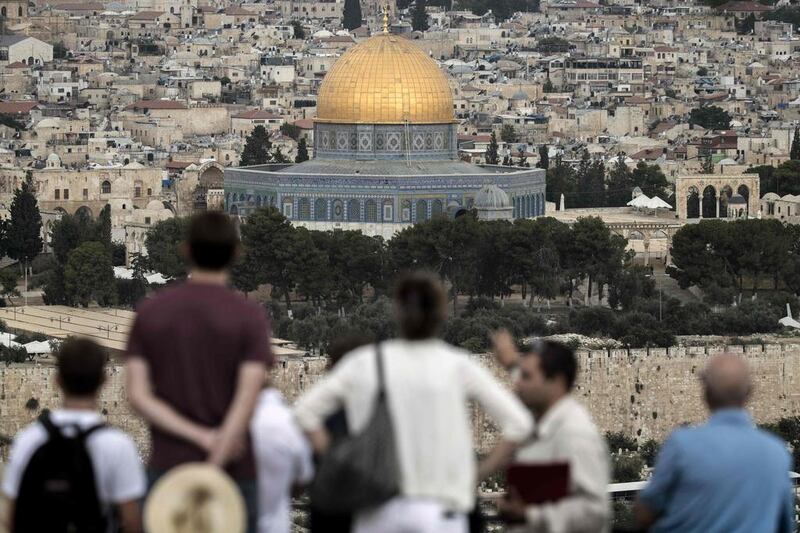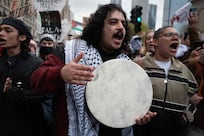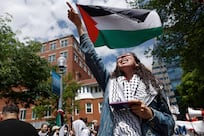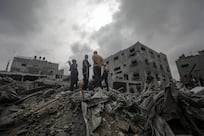To say that Palestinian residents of Jerusalem are caught between a rock and a hard place would be an understatement. Roughly 400,000 Palestinians live in the neighbourhoods and towns of East Jerusalem that Israel annexed following the 1967 war. Unlike their peers in the West Bank and Gaza Strip, they do not fall under the jurisdiction of the Palestinian Authority. Instead, they are residents of Jerusalem, with travel documents and identification provided by Israel. Despite this status, Israel and the Jerusalem municipality neglect their neighbourhoods and fail to provide services.
For 50 years, these Palestinians have lived in limbo. For the most part, they have rejected the Israeli citizenship afforded to them by international laws governing annexation, because doing so would be tantamount to recognising Israel’s annexation of Jerusalem. They have also boycotted municipal elections, so as not to legitimise Israel’s control over them as an occupied people. Acknowledging Israeli authority over East Jerusalem, the majority of Palestinians argue, is to normalise the occupation. To be clear, Israel would love nothing more than for Palestinian Jerusalemites to implicitly concede its sovereignty through engagement in city politics.
Earlier this year, cracks began to show in the unified “anti-normalisation” stance that Palestinians have maintained for decades. A slate of candidates united under the banner Al Quds Lana (Our Jerusalem) announced they would run in elections for city council. Citing inefficient leadership from the Palestinian Authority − which attempts to assist Jerusalemite Palestinians but has been useless in advancing Palestinian interests − and mistreatment by Israeli authorities, Al Quds Lana said the time had come for Palestinians to engage with the Jerusalem city council.
Aziz Abu Sarah, one of the leaders of Al Quds Lana and its short-lived candidate for mayor, told the Israeli news website +972 Magazine: "Young people were supportive, though we also had support among some older people. Some business owners, who have suffered tremendously under the Jerusalem municipality, were also in support. They are the ones paying the arnona [municipal tax], who are getting discriminated against, and who are suffering daily. The municipality does everything it can to make their lives miserable."
It is beyond doubt that Palestinians suffer in Jerusalem. Entire neighbourhoods are left to fend for themselves. Crime is rampant, because police forces don't bother entering Palestinian areas. Sewage management and rubbish collection present significant challenges, as the municipality deprives Palestinian neighbourhoods of resources and services, despite the fact that their residents pay taxes for them. To rub salt into this wound, the Jerusalem municipality uses tax revenue from Palestinians for new Jewish settlements in Palestinian neighbourhoods. Palestinians are made to pay for their own occupation.
This type of urban colonialism is as brutal as it is transparent. The coloniser entrenches its control, while sowing division among the colonised. The final blow in this push towards capitulation is for the colonised to recognise and embrace the rule of the coloniser. This is the central theme running through Palestinian anti-normalisation campaigns. While anti-normalisation efforts are widespread throughout the Palestinian territories, they are particularly raw and aggressive in Jerusalem, owing to the sensitivity of the city.
Responding to claims that his mayoral campaign fuelled normalisation, Abu Sarah noted: “When people accuse me of normalisation, my answer is that normalisation is maintaining the situation as it is. And in the current situation, the Israeli occupation has the upper hand ... Palestinians in Jerusalem have always been told that participating in the local elections is wrong, but to a lot of young people this doesn’t make sense any more. We feel abandoned by Israel, by the international community and by the Palestine Liberation Organisation.”
After Israel began reviewing his residence status − a common tactic used to intimidate and threaten Palestinians − Abu Sarah decided to abandon his campaign for mayor. He is hopeful that Al Quds Lana has set the tone for other Palestinians running for city council positions in future elections. Yet the fact remains that when it comes to local politics, Jerusalemite Palestinians are in a no-win situation.
Their demands for representation are just. Their poor treatment by the city of Jerusalem and Israel is evident. Engaging with the city council, however, will ultimately play into Israel’s overall control of Jerusalem. Moreover, it is highly unlikely that they will be able to improve daily life for Palestinians should they win seats.
Just look at the Palestinian citizens of Israel who have representation in the Israeli parliament. Their political situation has hardly improved as the country has lurched ever more to the right. Yet, the Al Quds Lana campaign has brought attention to the dire situation of Jerusalemite Palestinians. At this time, when the world has turned its back on the Palestine issue and Israel's control extends further by the day, such attention is critical for any long-term efforts towards a just end to the conflict.
Joseph Dana is the editor of emerge85, a project exploring change in the emerging world and its global impact





